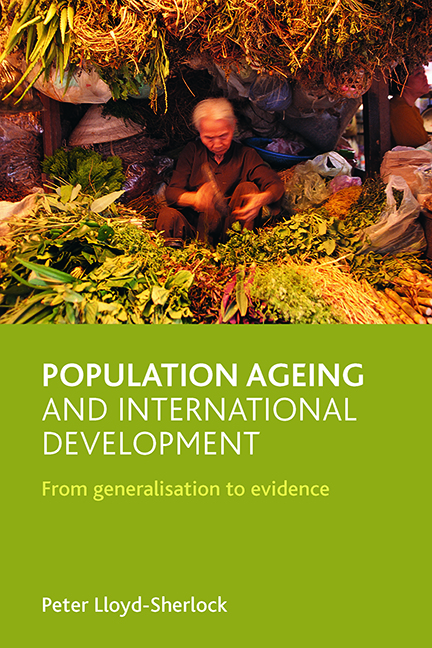Book contents
- Frontmatter
- Contents
- List of abbreviations
- Acknowledgements
- Notes on the author
- Introduction
- one International development and population ageing
- two Experiencing later life in contexts of development
- three Older people, pensions and development
- four Population ageing and health
- five Later life and social relations: family, migration and care
- six Ageing and development in South Africa
- seven Ageing and development in Argentina
- eight Ageing and development in India
- nine Conclusions and overview
- References
two - Experiencing later life in contexts of development
Published online by Cambridge University Press: 15 July 2022
- Frontmatter
- Contents
- List of abbreviations
- Acknowledgements
- Notes on the author
- Introduction
- one International development and population ageing
- two Experiencing later life in contexts of development
- three Older people, pensions and development
- four Population ageing and health
- five Later life and social relations: family, migration and care
- six Ageing and development in South Africa
- seven Ageing and development in Argentina
- eight Ageing and development in India
- nine Conclusions and overview
- References
Summary
Introduction
Chapter One looked at population ageing as an intrinsic part of development and considered how it will influence future development experiences. This chapter examines how changes associated with development affect the lives of older people. These relationships are complex and diverse, since patterns of development are variable and older people are a heterogeneous group. Chapter One showed that countries do not all follow the same pathways of development and modernisation. For example, patterns of fertility transition have been highly variable. At the same time, people will not all be affected by the same changes in the same ways. For example, the benefits of economic growth are not evenly distributed, so that people from different socioeconomic strata fare quite differently. Similarly, if women remain excluded from paid employment, they may see fewer benefits from economic development through their lives. This means that it is dangerous to generalise about the impacts of development on older people and any claims must be based on firm evidence.
This chapter begins by reviewing general assertions about the effects of development on older people. These claims pay particular attention to harmful consequences and say less about the potential benefits that development may bring. The rest of the chapter is devoted to reviewing the evidence for these claims, which begins by establishing clear terms of reference for the analysis, by reviewing the concepts of old age and later life. As part of this, the chapter contrasts simple life-stage models of old age with more sophisticated approaches based on lifecourse, cohort and generation. It then focuses on two key sets of issues. First, it explores the effects of development on poverty and wellbeing in later life; then, it focuses on how later life is experienced differently by men and women.
Throughout the chapter particular attention is paid to whether development encourages positive and active experiences of old age, or whether it promotes deprivation and dependency. This has a major bearing on the consequences of population ageing for development. If a large proportion of an older population is able to lead relatively healthy, active and independent lives, then the challenges created by population ageing should be manageable.
- Type
- Chapter
- Information
- Population Ageing and International DevelopmentFrom Generalisation to Evidence, pp. 35 - 60Publisher: Bristol University PressPrint publication year: 2010



